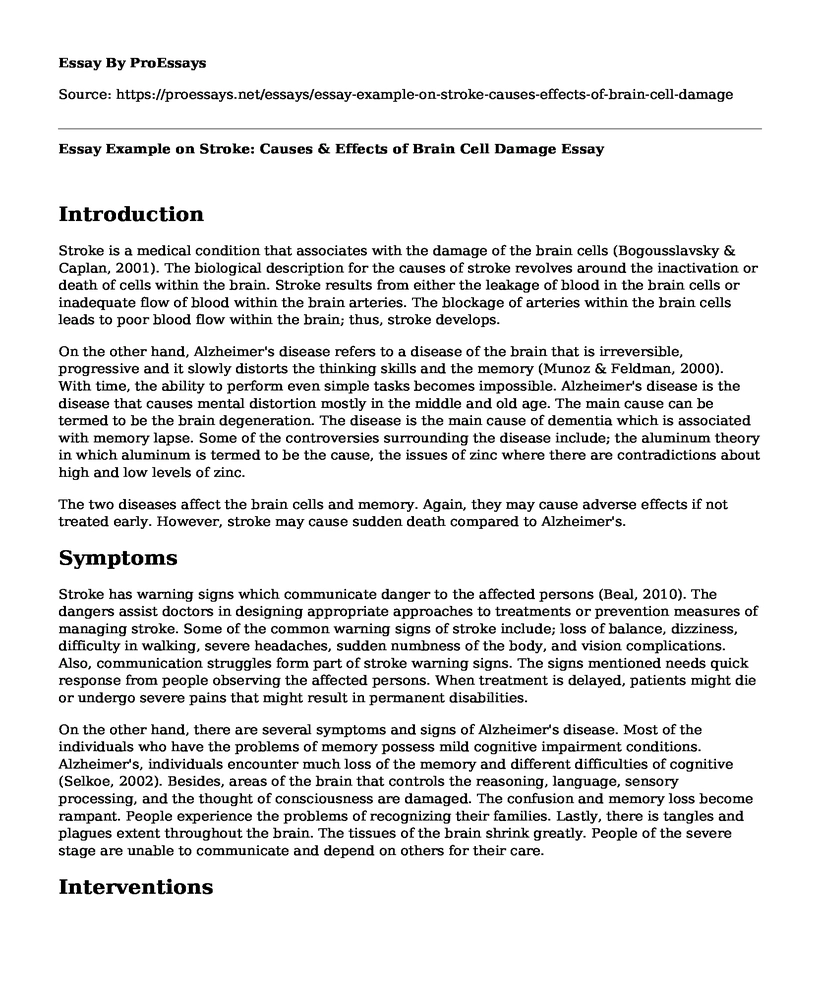Introduction
Stroke is a medical condition that associates with the damage of the brain cells (Bogousslavsky & Caplan, 2001). The biological description for the causes of stroke revolves around the inactivation or death of cells within the brain. Stroke results from either the leakage of blood in the brain cells or inadequate flow of blood within the brain arteries. The blockage of arteries within the brain cells leads to poor blood flow within the brain; thus, stroke develops.
On the other hand, Alzheimer's disease refers to a disease of the brain that is irreversible, progressive and it slowly distorts the thinking skills and the memory (Munoz & Feldman, 2000). With time, the ability to perform even simple tasks becomes impossible. Alzheimer's disease is the disease that causes mental distortion mostly in the middle and old age. The main cause can be termed to be the brain degeneration. The disease is the main cause of dementia which is associated with memory lapse. Some of the controversies surrounding the disease include; the aluminum theory in which aluminum is termed to be the cause, the issues of zinc where there are contradictions about high and low levels of zinc.
The two diseases affect the brain cells and memory. Again, they may cause adverse effects if not treated early. However, stroke may cause sudden death compared to Alzheimer's.
Symptoms
Stroke has warning signs which communicate danger to the affected persons (Beal, 2010). The dangers assist doctors in designing appropriate approaches to treatments or prevention measures of managing stroke. Some of the common warning signs of stroke include; loss of balance, dizziness, difficulty in walking, severe headaches, sudden numbness of the body, and vision complications. Also, communication struggles form part of stroke warning signs. The signs mentioned needs quick response from people observing the affected persons. When treatment is delayed, patients might die or undergo severe pains that might result in permanent disabilities.
On the other hand, there are several symptoms and signs of Alzheimer's disease. Most of the individuals who have the problems of memory possess mild cognitive impairment conditions. Alzheimer's, individuals encounter much loss of the memory and different difficulties of cognitive (Selkoe, 2002). Besides, areas of the brain that controls the reasoning, language, sensory processing, and the thought of consciousness are damaged. The confusion and memory loss become rampant. People experience the problems of recognizing their families. Lastly, there is tangles and plagues extent throughout the brain. The tissues of the brain shrink greatly. People of the severe stage are unable to communicate and depend on others for their care.
Interventions
Primary Interventions
The two diseases share the same intervention. For instance, the government has enforced legislation to ban the various substances that increase the risk of stroke and Alzheimer's. For instance, there are legislations to control smoking. People are also educated on the importance of healthy eating habits as well as exercising regularly to reduce the chances of contracting the disease.
Secondary Interventions
It is important to reduce the possibilities of stroke and Alzheimer's. Individuals should go for routine blood pressure checkup and cardiovascular disease risk assessment. People should also exercise, avoid alcohol, and quit smoking.
Tertiary Interventions
There are several stroke and Alzheimer's rehabilitation programs set aside for individuals with stroke. Again, there are support groups that allow members to share strategies for healthy living. Relevant authorities should support and invest in measures to curb the diseases.
References
Beal, C. C. (2010). Gender and stroke symptoms: a review of the current literature. Journal of Neuroscience Nursing, 42(2), 80-87.Press.
Bogousslavsky, J., & Caplan, L. R. (Eds.). (2001). Uncommon causes of stroke. Cambridge University
Munoz, D. G., & Feldman, H. (2000). Causes of Alzheimer's disease. Cmaj, 162(1), 65-72.
Selkoe, D. J. (2002). Alzheimer's disease is a synaptic failure. Science, 298(5594), 789-791.
Cite this page
Essay Example on Stroke: Causes & Effects of Brain Cell Damage. (2023, Jul 02). Retrieved from https://proessays.net/essays/essay-example-on-stroke-causes-effects-of-brain-cell-damage
If you are the original author of this essay and no longer wish to have it published on the ProEssays website, please click below to request its removal:
- Safety, Nutrition and Health in Early Education - Course Work Example
- The LGBT Population and HIV/AIDS Infection Paper Example
- Discrimination Against People With HIV/AIDS Essay Example
- Essay on Old Age Disorders: A Study of Dementia and Beyond
- Creativity, Problem Solving and Imagination: A Guide to Innovation - Essay Sample
- Essay Sample on 3 Essential Points of Needs Assessment: Handwashing, Advocacy & Health Concerns
- Home Office During the COVID Era - Essay Example







